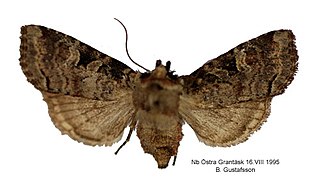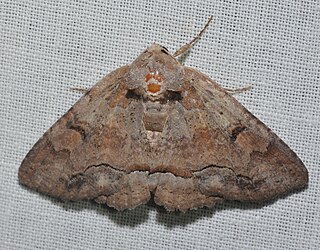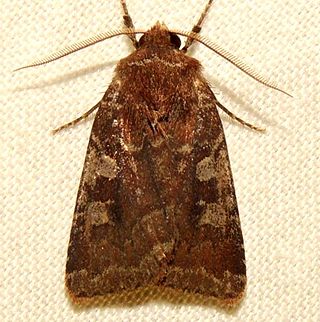
Hillia iris, the iris rover, is a species of cutworm or dart moth in the family Noctuidae. It was described by Johan Wilhelm Zetterstedt in 1839 and is found in North America.
Chaetaglaea fergusoni, or Ferguson's sallow moth, is a moth in the family Noctuidae. It was described by Vernon Antoine Brou Jr. in 1997 and is found in North America.

Zale confusa, the confused zale moth, is an owlet moth in the family Erebidae. The species was first described by James Halliday McDunnough in 1940. It is found in North America.

Lithophane grotei, commonly known as Grote's pinion or Grote's sallow, is a species of moth in the family Noctuidae. It was first described by Riley in 1882 and it is found in North America.
Leucania multilinea, the many-lined wainscot, is a species of cutworm or dart moth in the family Noctuidae. It is found in North America.
Ponometia septuosa is a species of bird dropping moth in the family Noctuidae. It is found in North America.
Helia agna is a species of moth in the family Erebidae. It is found in North America. The MONA or Hodges number for Helia agna is 8657.
Brachylomia sierra is a moth in the family Noctuidae, native to North America. The species was first described by James T. Troubridge and J. Donald Lafontaine in 2007.
Sympistis kelsoensis is a species of moth in the family Noctuidae. It is found in North America.
Neleucania patricia is a species of cutworm or dart moth in the family Noctuidae. It is found in North America.
Lesmone fufius is a species of moth in the family Erebidae. It is found in North America.
Metalectra bigallis is a species of moth in the family Erebidae. It is found in North America.

Lacinipolia triplehorni is a species of cutworm in the family Noctuidae. It is found in North America.

Tricholita chipeta is a species of cutworm or dart moth in the family Noctuidae. It was first described by William Barnes in 1904 and it is found in North America.
Papaipema harrisii, known generally as the cow parsnip borer moth or heracleum stem borer, is a species of cutworm or dart moth in the family Noctuidae. It is found in North America.
Ponometia virginalis is a species of bird dropping moth in the family Noctuidae. It is found in North America, where it has been recorded from eastern Texas to Nebraska, west to eastern Arizona in the south, and to Utah, Colorado, and Wyoming in the west.

Apamea quinteri is a species of cutworm or dart moth in the family Noctuidae. It is found in North America.
Euxoa oberfoelli, or Oberfoell's dart moth, is a species of cutworm or dart moth in the family Noctuidae. It is found in North America.
Trichordestra dodii is a species of cutworm or dart moth in the family Noctuidae. It is found in North America.

Sideridis congermana, or the German cousin, is a species of cutworm or dart moth in the family Noctuidae. It is found in North America.







